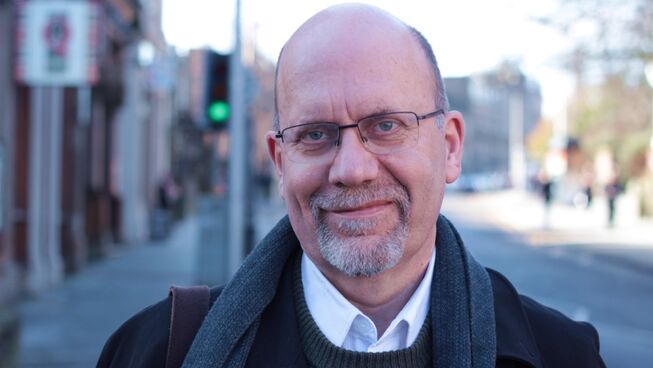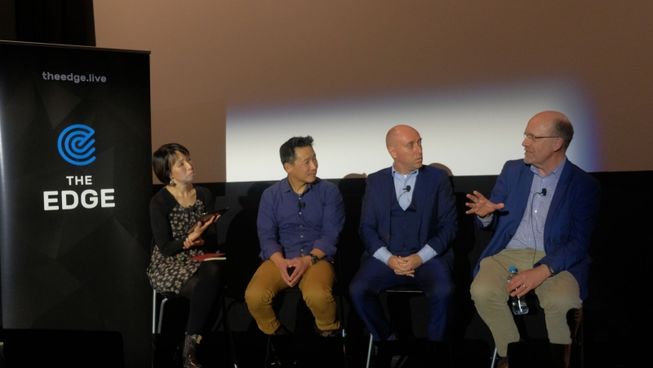
Here’s my favourite news story of the past year... There was a conference in Birmingham, England where 200 educated, intelligent people proposed that the earth was flat and Australia doesn't exist. These are the spherically challenged. They say that ‘round earth’ is a hoax, made up for us to believe, because Britain sailed out to sea and threw her convicts overboard, where they all drowned. There is no Australia. It's all a cover up for one of the greatest mass murders in history.
I'd never met anyone who is a Flat Earther until last year. I’ve met two since then. I thought they were joking, but they’re serious. Dave Marsh, an NHS worker said, “...for all of you who are Australians, you don't exist. You are nothing more than computer-generated personas.” There are people who really believe this. Now, that’s an extreme example. And Australia does actually exist in this post-truth world.
Did you know the Oxford English dictionary’s most popular new word in 2016 was ‘post-truth’? And, do you know why Donald Trump was elected? According to some journalists in the New York Times, it's because of 16 year old boys in Macedonia who were paid by Russia to target dumb Americans. Now, that's post-truth.
But there’s an irony here. People complain about a post-truth age, and how we need to claim back truth, but for years I've been debating people who say there’s no such thing as absolute truth. Now, these same people are complaining. So, yes, we live in a post-truth world, but it’s like... “Well, you made it ... you created it.”
Brendan O'Neill of Spiked Online is a Marxist. I like his writing, even though I don’t agree with much of it. He says about post-truth and fake news that, “it speaks to the declining moral and cultural authority of our own political and media class. It is the western world's own abandonment of objectivity and loss of legitimacy in the eyes of its populace that has nurtured something of a free-for-all on the facts and news front.”
I love newspapers. I subscribed to newspapers, until a few years ago. Today, newspapers are shedding journalists and employing opinion columnists. I want news, but the news is disappearing. Virtually every newspaper in the UK takes one side, politically. The current perception is someone will report a story on the basis of their political opinion. I think that's a dreadful place for us to be as a society.
And so, everyone has their own truth, but when you think about it, that's complete nonsense. What's my truth? My truth is how I see things. Why I see things this way doesn't really matter.
We’ve created a generation that's been told there’s no such thing as absolute truth, but is now being confronted with the consequences of that insane philosophy, and complaining about post-truth. It's no surprise people struggle to recognise the difference between real and fake news. It seems there are far too many people willing to ascribe the term ‘fake news’ to news they don't like or that contradicts their political opinions or world views. I'm a historian and it’s a reminder that we need to be incredibly careful that we present facts and truths, even when they are uncomfortable. So, how do we know what's true? For me, that’s enormously significant.
I would argue we need to return to rational thinking. Our minds need to be renewed. We need a rational, coherent world view and we need to have trustworthy and thoughtful analysis. So, I come back to the question: what is truth?
I do think there’s such a thing as truth. I don't think we should give up on it. I think that truth brings freedom. And I think that truth is best personified in a person. So, just allow for the moment, the possibility that God did send his son, and Jesus said, “I am the truth.” For me, that’s fundamentally important. A man called Dick Lucas said, “God does not so much give us a watertight argument, but a watertight person, against who, in the end, there can be no argument.”
You see, I believe all truth is God's truth. But, if you're not a Christian, I believe you can tell me the truth. I also know that Christians lie. I'm not saying just because someone's a Christian, they always tell the truth. Lies come from the devil. Truth comes from Christ. And whoever we are, we should be seeking truth. Or to put it another way ... we need the truth, for the truth.
Note: This is an abridged version of David Robertson's talk from latest Edge written by David Blissett
Scroll down to 'Related Content' to watch the full talk by David Robertson, our other Edge speaker Scott Monk and the panel discussion featuring Sam Chan and moderator Justine Toh.




